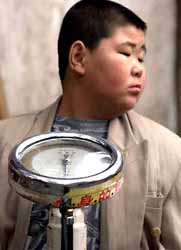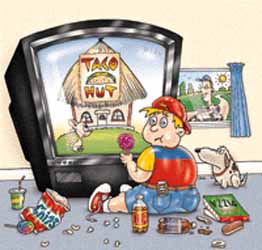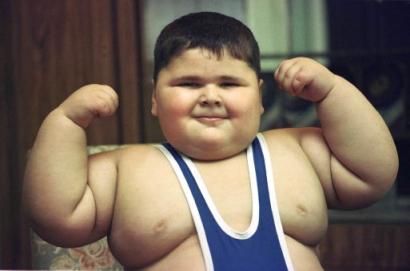

June 28, 2003
It is very distressing to see a multitude of diabetic children as a result of obesity. Diabetes affects the pancreas and as such, affects the Solar Plexus Chakra, causing an imbalance. This manifests in a lack of will, overemphasis on power, anger, poor digestion, eating disorders, fear and hate. It is one of the main chakras of the individual and is associated with the functioning of the aura and psychic energy field. We owe it to our children and to our future to deal with obesity now, before it is too late, before we have lost a generation of future adults who possess the potential to lead us into a higher spiritual dimension.
As we become more aware of our own needs, and trace them back to childhood, we are also discovering things about children that were overlooked in the past. Among them are ADHD, Dyslexia, and now another major problem of the 21st century, obesity.
Were you an overweight child? Why was that? Did anyone help you, or did you overcome that issue on your own? How many times have you lost and gained weight in this lifetime, the Yoyo Effect?
Many parents believe that children will outgrow most of their problems on their own without parental guidance. In some cases that may be true. But in most cases, all children have one or more things wrong with them, major or minor, learning disabilities, emotional issues, or physical challenges, that must be dealt with early on, preferably by age 5.
By the teenage years, when children begin to assert their independence, they will 'feed the need' and do whatever they want in many cases. Often children at puberty are out of control.
I have always believed that if you leave an infant, one who is sitting up, alone with tiny bits of different kinds of food, they will select what their bodies need, almost by instinct. They know what their bodies need.
Then there are many different schools of thought about how long a baby should be on formula with the introduction of baby food or table food. Again, an infant knows what it needs. Some babies will favor a bottle and some will prefer foods. Infants have definite opinions on what they like and needs. I am an 'options' person. Offer a baby options.
Watching your child's weight begins the day they are born.
Using food as a reward is the worst thing you can do. Rewards are kisses and hugs and saying, "I am proud of you."
Do not deprive the child of all sugar. As they get older, they will buy it on their own, to get the 'sugar-high' fix.
Research on the internet will show children that they are not alone in the 'battle of the bulge'.
Addressing obesity with a child, should come from a place of love and concern.
Motivation is the KEY! It always is.
In many cases, one or both parents are overweight. You cannot tell a child, "You're a fat pig!" when you are fat. This is about teaching the child about respect of their bodies and of you.
Joining a gym with a child, can create a bond between parent and child. many of my clients are taking this road with their children.
Buying exercise equipment or videos dealing with losing weight helps. There are so many choices now.
Often a doctor or dietician or program such as Weight Watchers works well. Some kids go to Fatty Camp.
You have to explain why they need to lose weight, such as being able to play sports more easily.
You do not want the other children laughing at them and teasing them.
You do not want to set them up with issues of diabetes as they become adults.
You do not want to set up a pattern where food is a comfort zone and a substitute for love.
You must address the emotional issues behind the eating patterns.
Changing a child's eating patterns is a family effort. Help your child.
Do not let a physically handicapped child get fat.

There are many reasons children are overweight:
- Emotional Problems
- Eating patterns at home
- Genetics, one or both parents are overweight
- Illness
- With one or both parents at work, kids eat more 'fast, fatty' foods which taste good but are often not healthy.
- A single mother, who has to work, and does not have time to take her kids for sports and often wants to know that her child is home safely after school, will find that the child will eat the wrong foods.
- Our society has become very sedentary, television, computer and video games contribute to children's inactive lifestyles. The generation of computer kids, often live on the computer, do their homework, email to friends, and play games after school.
Recent News Articles:

The Big Mac. Kraft Lunchables. Pizza Hut's six-cheese Insider pizza. These and other artery-choking products represent the American food industry's mastery of the art of selling high-fat, high-calorie food.But now, with the nation's waistline stretched beyond belief, some food companies are recasting themselves as good corporate citizens alarmed at the rate of obesity in the United States and willing to modify their offerings to help avert a looming health care crisis.
McDonald's and the Frito-Lay division of PepsiCo plan to remove saturated fats and trans fatty acids from French fries, chips and other products because of concerns about their link to high cholesterol, heart disease and diabetes.
Kraft Foods, which makes Oreo cookies, Velveeta cheese and Oscar Mayer cold cuts, said last week that it planned to reduce portion sizes and cut the fat and sugar content of many products. The company also said it would stop marketing its products in schools.
Some health experts have called Kraft's announcement a landmark, the clearest sign yet that big food companies intend to take responsibility for their role in helping create a super-size nation.
But some consumer advocates and health experts are skeptical. They doubt that companies that have profited, and helped create, a culture of overeating, particularly among children, can be trusted to help put America on a diet.
"Are they going to pull back some of this marketing to children?" asked Margo Wootan, a nutritionist at the Center for Science in the Public Interest, a consumer advocacy group. "We'll see. Their marketing aimed at kids is terrible. And it has increased. They bypass the parents and go directly to kids. They make parents have to say no all the time."
Many food companies, of course, have long marketed low calorie or low-fat foods. What is new in the companies' latest moves is their pledge to take steps aimed at moderating consumption of their core and often most profitable products — the tasty, fatty, salty or sugary fare that consumers seem unable to resist.
The shift comes at a time when food companies are under growing pressure to do something about the obesity epidemic. Class-action lawyers are focusing on food makers with much the same fervor they used to have when going after the tobacco industry. Lawmakers and regulators in the United States and Europe are also threatening to crack down on food makers by adopting new labeling and marketing restrictions.
In Sweden, for instance, advertising aimed at children under 12 has been banned. And the New York City public schools recently announced a ban on soda, candy and other sugary snacks from school vending machines to address obesity in children. Yesterday, the federal Food and Drug Administration announced that food labels would have to list levels of trans fatty acids by 2006.
Kraft's moves appear bold for the industry. But some consumer advocates point out that Kraft is majority owned by the tobacco giant Altria, formerly known as Philip Morris, which has been harshly criticized and even sued for the way it marketed its tobacco products. "Kraft is playing good citizen,' said John McMillin, a food industry analyst at Prudential Securities. "Altria, their majority owner, has been through this in tobacco. And they don't want to wait till something happens to them."
Even Wall Street analysts say the big food companies are facing serious financial risks because of soaring obesity rates. "There is a clear long-term risk to producers of fast foods, soft drinks, confectionery and snacks that anti-obesity measures will curb their ability to grow revenues in the future," Jason Streets, an analyst at UBS, wrote in a report issued in November. "We believe there are risks associated with obesity that have not yet been factored into share prices."
UBS recently issued a report that ranked large companies with the highest percentage of unhealthy, or "less good food" offerings, and Hershey, McDonald's, Coca-Cola and Nestlé were ranked Nos. 1, 2, 7 and 10 respectively on the obesity index. While hardly a scientific study, the report suggests that Wall Street is at least handicapping the effect that the public health debate could have on the corporate bottom line.
The number of obese people in the United States has more than doubled since 1980, and is near 50 million, according to the Centers for Disease Control and Prevention. And there are estimates that obesity-related problems cost the nation about $70 billion a year, reported the International Obesity Task Force in London.
The World Health Organization, which recently called obesity a worldwide epidemic, is pressing food companies to change their product lineups and tame their marketing to children.